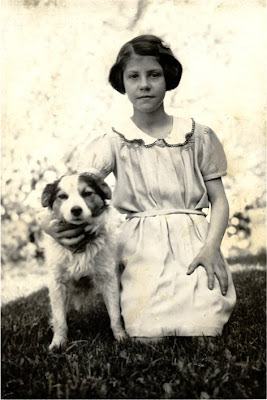The Railroad Comes to Wallowa County, Oregon
When my brother Norm was completing coursework for his bachelor's degree, one of the classes he took was an oral history course. The major requirement was that he interview someone and record their story. Luckily for the family, Norm chose his subject well. He interviewed our maternal grandfather, Elmer Clifford Miller, so stories that would otherwise have been lost are preserved. Thanks, Norm!
When Elmer was just a toddler, his parents (you heard the story of the harvest meeting of Minnie Blomgren and Samuel Miller in last week's post) moved their young family from Walla Walla, Washington to Wallowa County, Oregon where Samuel's homestead claim had been staked. Through Norm's words, Elmer's story continues:
"Our family was, for the most part, self-sufficient. All the vegetables that the family needed were raised in the garden. Hogs, chicken and beef were raised to provide meat, along with the venison and fish that the men were able to bag. Wheat was the family's cash crop; at harvest time the wheat would be sacked and taken to the mill in Lostine where it was traded for flour. It took approximately 10 days to take the wheat to Lostine.
The family always had at least two milk cows, though this was not always enough. Elmer recalls one year that both of the family milk cows went dry and a neighbor brought one of his for the family to use so the children would have milk. The next spring, that neighbor had a draft horse go lame, so my great- grandfather returned the favor by taking one of his shires to the neighbor in need. All fieldwork was done with draft horses until around 1917 when tractors and threshers were bought to ease the workload.
The family always had at least two milk cows, though this was not always enough. Elmer recalls one year that both of the family milk cows went dry and a neighbor brought one of his for the family to use so the children would have milk. The next spring, that neighbor had a draft horse go lame, so my great- grandfather returned the favor by taking one of his shires to the neighbor in need. All fieldwork was done with draft horses until around 1917 when tractors and threshers were bought to ease the workload.
Trips to Wallowa and Enterprise were slow, about 2 hours each way, so they were not taken very often. Mostly trips were taken to replenish supplies of salt, sugar and flour, though occasionally the family was treated to a show at the theatre in Enterprise."
Getting from Wallowa to LaGrande (where Minnie moved after Samuel's death in the 1920s) was not easy before the railroad. There was a stagecoach that traveled the 50 miles, but the journey took three days. Travel in a stagecoach was decidedly a bone-jerking experience, with rutted roads running through the Grande Ronde and Wallowa River canyons.
In 1908, the train line was completed between Union County and Wallowa. The first train arrived from LaGrande, Oregon on September 20, 1908 and the following year the line was continued to its end at Joseph. The train cut the duration of the journey from Wallowa to LaGrande to only three hours by train. Quite an improvement over the stagecoach's time!
In 1908, the train line was completed between Union County and Wallowa. The first train arrived from LaGrande, Oregon on September 20, 1908 and the following year the line was continued to its end at Joseph. The train cut the duration of the journey from Wallowa to LaGrande to only three hours by train. Quite an improvement over the stagecoach's time!
The arrival of that first train was cause for great celebration and most of the county's residents made their way to see the spectacle. My grandfather, a boy not quite eight years old, was in the crowd. The newspaper, the Wallowa Sun, described the event:
"As the train slowed down, there arose a cloud of dust from the bluffs across the river and the deafening noise of explosion after explosion rent the air and mingled with the cheers of the crowd and the excursionists. Then two bands caught up the enthusiasm and thrilling strains of music pealed forth."
My grandfather remembered that the noise, the huffing and chuffing of the train, the shrill whistle announcing its arrival, scared the family's team of horses half to death. He still embodied the memory of the excitement that swept through the townspeople as the train chugged into the station for the first time. But did he, as a child, really appreciate how significantly the coming of the train changed lives, bringing the people of remote Wallowa County into much closer contact with the rest of Oregon? Probably not. He probably only reveled in the fact that after train travel became possible, he and his parents and his many siblings got to take a couple of trips to LaGrande each year. In 1910, LaGrande was a town of 4800 people, so for rural folk it must have seemed like a bustling city.
Those trips to LaGrande included a Fourth of July Celebration that featured renowned former baseball player-turned-evangelist Billy Sunday in 1919.
And to read more Sepia Saturday stories, click HERE.





Comments
I loved to read this story, and thanks to Norm too. The lives of these early settlers on the land must have been so rigorous and hard, but rewarding. The advent of the train must have made a huge difference to their sense of isolation.
On another note Mr Billy Sunday has the face of an evangelist...that fervent glaze to the eyes...what is it with them that they all have that look?
Happy days
xoxoxox,
rebecca
It overwhelms me to think of how rapidly life changed in the past century. My own grandfather, born in 1920, was born on a similar sort of farm and rode a horse to school. And here's a funny tie-in: one of my grandfather's sons went on to live in Walla Walla. (That place name just tickles me.)